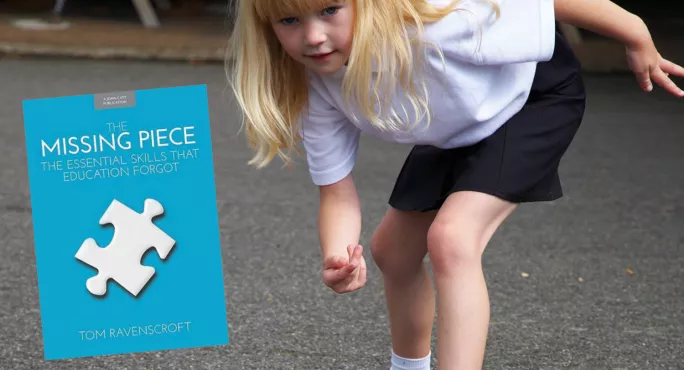- Home
- Book review: The Missing Piece: the essential skills that education forgot
Book review: The Missing Piece: the essential skills that education forgot

I must admit that I approached this book with a smidgen of cynicism. Do teachers really need another ex-Teach Firster to tell them what they are doing wrong?
I changed my view quickly, however, because Tom Ravenscroft has not only done his research - the sources in his book are wide and varied - but he also wears his learning lightly. The result is a very readable and convincing argument for the explicit teaching of skills.
Ravenscroft bravely confesses that his experience of teaching in an inner-city London school provided the springboard for his conversion. Writing of his 15- and 16-year-old pupils, he admits: “I was doing everything I could to get them their grades. And in the process I was preventing them developing the skills that they would need in a few months’ time. They were unable to work together, they could not communicate effectively and they gave up easily.”
So he changed the way he taught. He took his pupils into the world of work, arranging visits to City firms. He created opportunities for them to run their own small businesses, only to see one fail within 80 minutes because the pupil directors did not have the skills to communicate and collaborate. He realised that “to really make progress, I would have to teach the skills directly”.
Ravenscroft treats the reader to an erudite exposition of several different classifications of skills before he puts forward his own. These are interpersonal skills, such as being able to intact with others and present; creative problem-solving; taking responsibility; achieving goals; being adaptable; being resilient; and demonstrating a positive attitude. His list is a useful guide and covers the main ground.
In subsequent chapters, Ravenscroft investigates each of these skills in turn. Communication skills, for example, are divided into listening and presenting. Why these skills are important, how they enable learning to take place and how they should develop as children mature into young people are all considered in a series of chapters that draw on a wide range of sources, from Cicero to the CBI.
Knowledge vs skills
Ravenscroft is not afraid to enter the dangerous battleground that exists between knowledge and skills.
Knowledge, he says, “is the ability to recall, understand and explain”. Competencies and skills “are the ability to do something - to successfully enact a repeatable process” and are taught through “modelling, theory, application, reflection and continued practice”. Both, he argues, should be taught, and the focus on each should be clear.
The problem is, of course, that teachers are not prepared for teaching skills. Such is the antipathy of schools minister Nick Gibb to the concept of skills, he refuses, apparently, to have the word included in any Department for Education document.
Based on Ravenscroft’s experience as the founder of Enabling Enterprise - a national body that worked with more than 80,000 students in the past year, in partnership with more than 130 employers - to promote the development of essential skills in pupils of all backgrounds, he puts forward six principles:
- Keep it simple: focus on a consistent set of essential skills.
- Start early and keep going: primary pupils need to develop essential skills that can be built upon in secondary.
- Measure it: how do we know if skills development is successful unless it is measured?
- Focus tightly.
- Keep practising.
- Bring it to life - through links with employers, universities and entrepreneurs.
This is an important, if a little overwritten, book. The skills agenda is falling on stony ground. I agree with Ravenscroft that the current neglect of skills is a huge mistake and I will leave the final words to him:
“Over the last 10 years, I’ve had the enormous privilege of leading a brilliant team of teachers. We have worked with thousands of classroom teachers and volunteers and over 200,000 students.
“We have seen these children and young people, often from the most disadvantaged backgrounds, build those essential skills with the same rigour and focus as any other academic learning. They can become compelling communicators, balance logic and creativity, lead and be led, set their own goals and stay on the path to achieving them.”
Mary Bousted is joint general secretary of the NEU teaching union
Keep reading for just £1 per month
You've reached your limit of free articles this month. Subscribe for £1 per month for three months and get:
- Unlimited access to all Tes magazine content
- Exclusive subscriber-only stories
- Award-winning email newsletters



